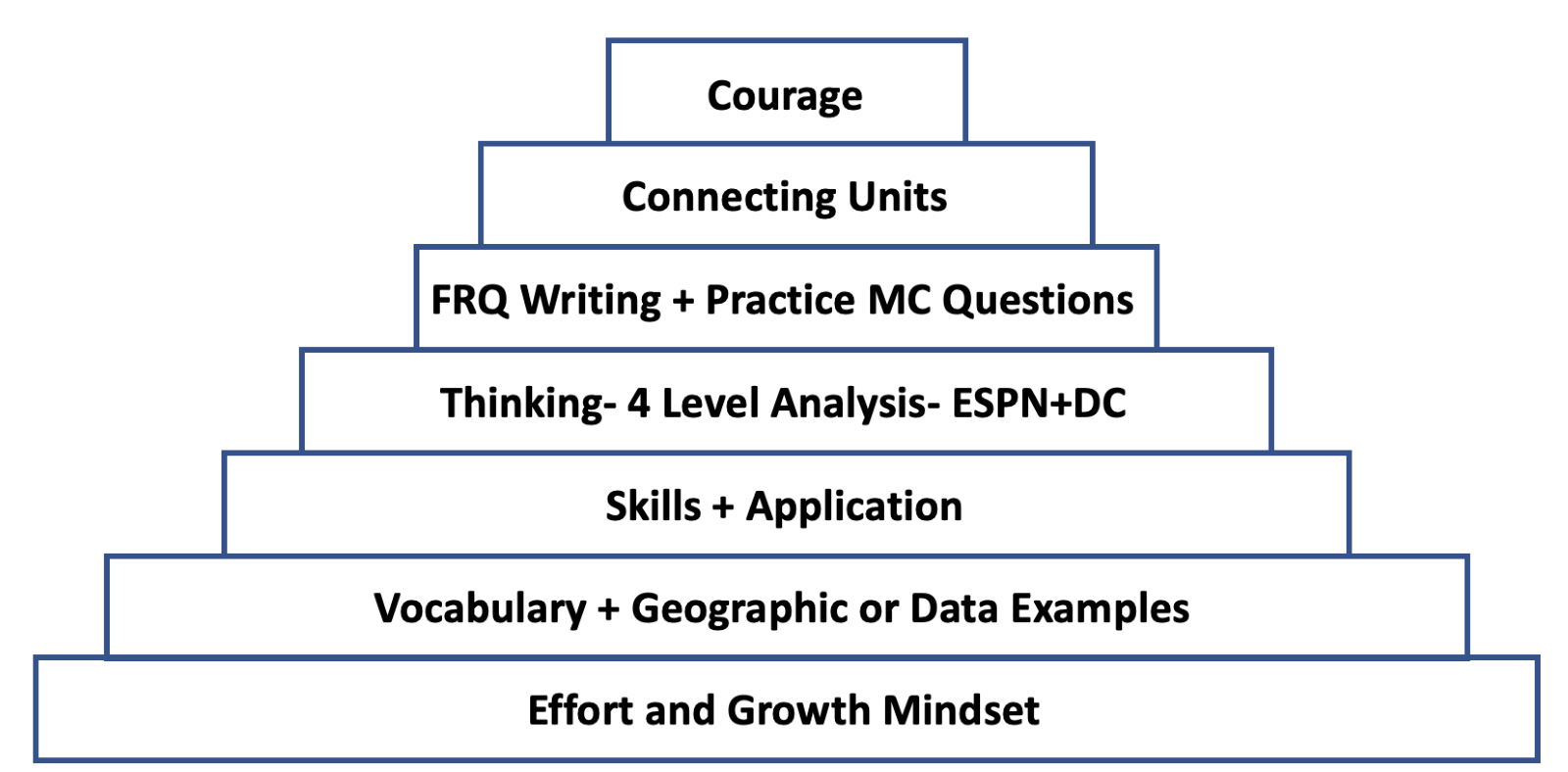You've Got This! A Message for our AP® Human Geo Teachers
The AP® Human Geo test is fast approaching. But don't stress! Author David Palmer offers words of encouragement and advice for seeing your students...
AP & Honors Mathematics
Explore Wiley titles to support both AP and Honors mathematics instruction.
Literacy Skills & Intensive Reading
Connections: Reading – Grades 6–12
Empower student success with a proven intensive reading program that develops strong reading skills in striving readers.
Drama, Speech & Debate
Basic Drama Projects 10th Edition
Build students’ confidence and competence with comprehensive, project-based theatre instruction.
Literature
Connections: Literature
Support learners as they study dynamic, relevant texts and bring the richness of diverse voices to students through literature.
Literature & Thought
Develop critical thinking, reading, and writing across literacy themes, genres, historical eras, and current events.
Language Arts
Vocabu-Lit® – Grades 6–12
Help students build word power using high-quality contemporary and classic literature, nonfiction, essays, and more.
Connections: Writing & Language
Help students develop grammar, usage, mechanics, vocabulary, spelling, and writing and editing skills.
Reading/English Language Arts
Measuring Up to the English Language Arts Standards
Incorporate standards-driven teaching strategies to complement your ELA curriculum.
English Language Learners
Measuring Up for English Language Learners
Incorporate research-based best practices for ELLs with an approach that includes a focus on language acquisition strategies.
Mathematics
Measuring Up to the Mathematics Standards
Incorporate standards-driven teaching strategies to complement your mathematics curriculum.
Foundations
Measuring Up Foundations
Help students master foundational math skills that are critical for students to find academic success.
Science
Measuring Up to the Next Generation Science Standards
Give students comprehensive NGSS coverage while targeting instruction and providing rigorous standards practice.
Assessment
Measuring Up Live
Deliver innovative assessment and practice technology designed to offer data-driven instructional support.
For a better website experience, please confirm you are in:
4 min read
David Palmer Apr 8, 2022 2:29:40 PM

We are just weeks away from the AP® Human Geography Exam—wow! As teachers we are nervous, anxious, and hoping that we have done everything we can to support our students. These are normal feelings and should be embraced. Don’t be freaked out or over-stressed— use that nervous energy to motivate you and your students. Over the next few weeks encourage your students to study like they have never studied before. It is their academic “Super Bowl.” Don’t be afraid to embrace that mindset with your students.
Many students and teachers are fearful of not passing—don’t be. Success is found in effort, challenges, and academic growth. Learning, working hard, and taking the test is a success. Scoring a high score is just a big bonus. Personally, I have always tried to teach my students to score a “5” and set that as a goal, but I always emphasize effort over score. Some of my biggest success stories are students who stay in the class the entire year, take the test, and score a two. They went for it and are worthy of celebration.
But how do we maximize a student’s ability to perform to the best of their abilities in the coming weeks? Your students will need to work and spend time getting ready for the exam. They can rise to the challenge!
Below is a graphic that I use to encourage and guide my students’ preparation for the AP exam. The bottom level is the foundation of our learning and includes the teacher’s and students’ effort and willingness to engage in a growth mindset. Each layer are bricks that we build upon until we have a sturdy structure for learning.

Vocabulary/Key Terms: The first key content skill as we work up the pyramid is that students are rooted in an understanding of strong content vocabulary. Use the “Key Terms” at the end of each topic within the AP® Human Geography coursebook by AMSCO®. The goal is for students to define and provide a geographic example, detail, or data for as many “Key Terms” as possible. The more they know, the more likely they are to interpret questions on the exam in the proper context.
Just for fun! Turn this into a game where students work in pairs and take turns defining and explaining terms to each other. If they can’t define it, they don’t know it. Focus on improvement and adding to their bank of knowledge.
Skills and Application: Being able to use and apply the “Essential Skills of Geographers” described in Chapters 1 and 2 is critical. Throughout the book there are numerous opportunities to practice and master these skills. Give students lots of opportunities to practice skills with maps, charts, images, and data in the weeks leading up to the exam. Additionally, at the end of each unit there are activities that students can use to apply these essential skills.
Thinking: Four Level Analysis (Chapter 1) and ESPNDC discussed in the introduction (xxix) both provide critical frameworks for students to think about geography and the impacts of patterns and processes. Remember that Four Level Analysis is an attack strategy to help students make sense of maps, charts, and graphs. ESPNDC stands for the economic, social, political, environmental, demographic, and cultural characteristics of topics discussed in the course.
Review strategy: Show students a map and have the students conduct a Four Level Analysis and then look for economic, environmental, or political impacts of the patterns shown on the map.
FRQ Writing and Multiple-Choice Practice: Use the suggestions provided in the introduction to guide your students’ writing and test taking. Provide sample questions from the book or College Board® materials for students to practice. Provide sample FRQs to two to four students and have them take five minutes to discuss the question and determine what the question is asking them to do and then brainstorm some potential answers. Emphasize to the students to pay attention to the verbs and how much to write. For describe, explain, and compare verbs I recommend a three- to five-sentence response with a clear and well-stated claim that is supported with details, analysis, examples, and/or data. Warning: one-sentence responses for these verbs rarely score a point.
Practicing multiple-choice questions is critical and should involve reviewing dozens upon dozens of questions. In class, have students in pairs read a question and justify to each other why they think one answer is correct. Then students should use their book or other resources to validate their response. Additionally, allow your students to review past exams, quizzes, and other College Board resources to practice and reflect on numerous multiple-choice questions.
Just completing the questions is not as important as reflecting and thinking about the questions. For both FRQ and multiple-choice questions, a student’s knowledge of content vocabulary and ability to apply geographic skills and thinking will be critical to their success. Remind students to answer all the questions and, if they are not sure of the answer, pick their best answer, circle the question, and move on. I strongly suggest assigning the practice exam in the book and providing a mock exam that closely mimics the actual AP exam in time and situation.
Connecting Units: This is a higher-level element but many of the best scoring students can see and explain connections across units. Each FRQ and multiple-choice question has a primary unit of focus, but students should be prepared to discuss concepts from other units, particularly with free response questions. For example, question one of the practice exam is mainly focused on a political geography scenario but requires responses related to population, economics, and political geography.
Courage: Taking an AP® Human Geography class, signing up for the exam, devoting time to study and prepare for the exam, and taking the exam is challenging and takes courage. In sports, to win a game you must have the courage to play. Academic excellence is not any different. AP® students are varsity level students who should be celebrated for their abilities and the courage that it takes to challenge themselves. You, the teacher, are their coach. While we don’t play the game (take the test), we feel and see the emotions, sacrifices, and worries of our students. Validate and celebrate your students’ courage and enjoy the experience. Don’t forget to celebrate your own courage, sacrifices, and successes teaching this course. Teaching human geography is a worthwhile journey. Best of luck to you and your students!
David Palmer is the lead author and senior consultant of Advanced Placement® Human Geography, 2nd Edition coursebook by AMSCO® and has taught AP® Human Geography for over 20 years. He is a College Board® Consultant, NCGE Distinguished Geography Teacher Award winner and has been a Question Leader during the scoring of AP® Human Geography exams. David has taught and presented at numerous institutes and conferences in the United States, China, India, and Japan. David has an undergraduate degree from the University of Colorado and a Masters from Colorado Christian University.

The AP® Human Geo test is fast approaching. But don't stress! Author David Palmer offers words of encouragement and advice for seeing your students...

So, you have taken the plunge and are now teaching AP® Human Geography. People will ask “What is Human Geography?” but you have no idea how to answer...

Early in a school year it can be a real challenge to know how to begin teaching students critical skills they need to score on the AP® U.S. History...

It’s the time of year when teachers and students begin their final push towards preparing for the AP Human Geography exam. Teachers and students...

Primary sources provide students with a personal window into the past, enabling them to view history as human stories rather than a list of facts....

Many teachers consider the Document Based Question (DBQ) of the AP® European History Exam to be one of the more challenging aspects of the course....

Each year after the AP® exam I ask students to evaluate my class. Last year, they overwhelmingly identified that they wanted to work on FRQs more...

In 2021, the College Board® added a new section to the AP® U.S Government and Politics Exam: quantitative analysis. This counts for four raw points...

As the AP® exam draws near, students often become increasingly anxious. Review games and activities can target areas students need to review while...

The Free-Response Question (FRQ) portion of the Advanced Placement® exam provides test takers with the opportunity to demonstrate their knowledge on...

Though the College Board’s AP® United States Government and Politics FRQs #3 and #4 may be more involved and seem more challenging, FRQ #1 and #2 can...

AP Social Studies courses ask students to do something uniquely difficult: think with big,universalideas while working with very specific...
